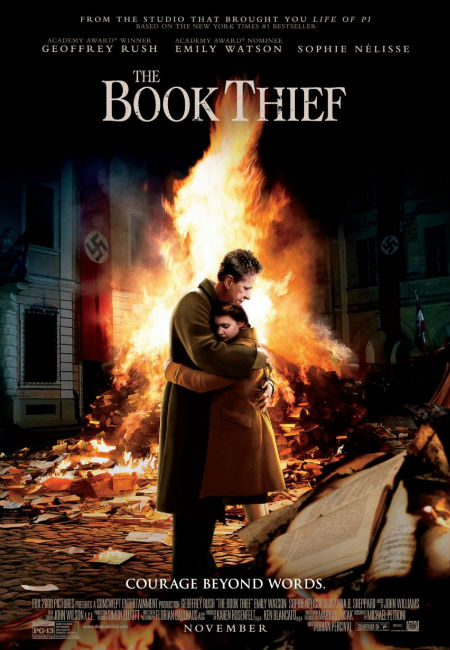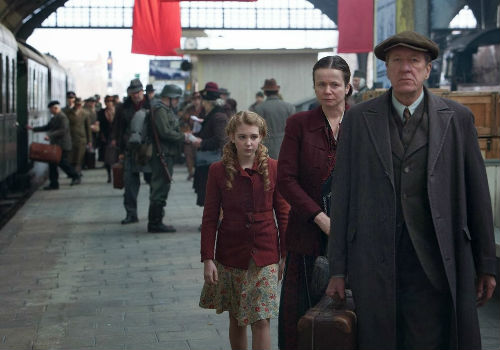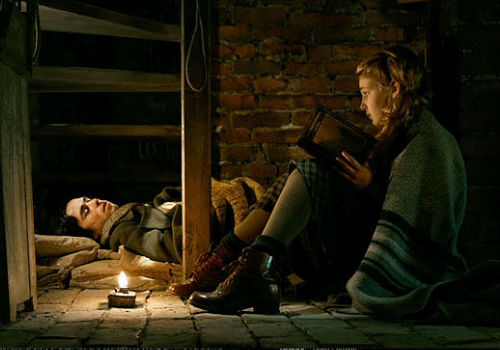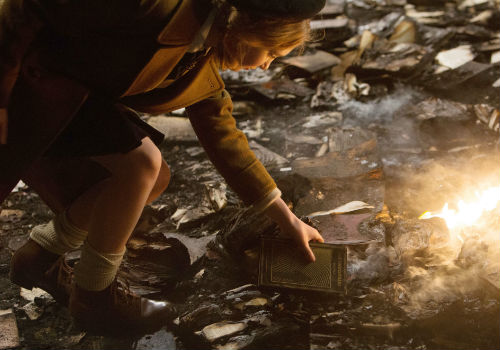
Book to film adaptations are always fraught with some degree of risk.
Cleave too closely to the original text and you’re accused of showing little to no artistic imagination; deviate too far from it and devoted readers and critics alike will wonder why you bothered in the first place and skewer you in the unforgiving court of public opinion.
It’s a thankless task and one perhaps complicated even further when your source book has a higher profile than most, such as is the case with Australian author Marcus Zusak’s much loved 2005 bestseller The Book Thief.
The Book Thief portrays life in Nazi Germany from the perspective of Liesel Meminger (Sophie Nélisse), the daughter of suspected communists who is placed in foster care with Hans and Rose Hubermann (Geoffrey Rush and Emily Watson) in the fictional town of Molching near Munich, ably juxtaposing the horrors of the Holocaust such as the forced march of captive Jews to Dachau and Kristallnacht in 1938 with the more mundane struggle to survive in a country at war.
Through the person of Death, who acts as the narrator throughout, we are shown Liesel’s life in all its emotional complexity and physical hardships, her struggle to learn to read and write, her friendship with Rudy Steiner (Nico Liersch) next door and her obsession with stealing books, starting with the gravedigger who buries her brother in tragic circumstances on the way to her new home.

While she can neither read or write at the time of her first literary acquisition, she is smitten with the idea of books, both as a reminder of people and events and as ways of exploring worlds beyond her own, and with Hans’ help, is soon fluent in the written word and thoroughly in love with literature.
Through people such as the mayor’s wife Ilsa Herman (Barbara Auer), who allows Liesel access to her vast and under used library when she drops off the laundry that Rose Hubermann takes in to get by, and Max Vandenburg (Ben Schnetzer), the Jewish son of Han’s now deceased World War One fighting comrade who the Hubermans bravely hide from the authorities, her love of reading grows in leaps and bounds, sustaining her through the many twists and turns of her young life, both good and bad.
Thanks to Zusak’s keen sense of observation, poetic writing style and vividly realised characters, The Book Thief bristles with a dramatic intensity and life that you would not immediately associate with a book that largely confines itself to the goings on in Himmel Street, where the Hubermans live, during the war.
You would be foolish, of course, to expect any cinematic adaptation to slavishly adhere to the exact narrative style of the book from which it is drawn.
They are entirely different mediums and what works beautifully in a book will not translate well to the big screen and vice versa.
With that in mind however, I still found The Book Thief lacking in a number of ways as a movie.

While remaining reasonably faithful to the broad brushstrokes of the story, and by necessity compressing many of the drawn out elements of the narrative into a far more concise storytelling style, the screenplay by Michael Petroni has foregone or muted many of the elements that made The Book Thief come alive as a book.
Rose, for instance, while loving in her own way, is a loud, opinionated and emotionally brusque woman, prone to frequent and colourful use of expletives, who is not to be trifled with as Liesel learns early on.
In the movie however, while some of those rough edges have been maintained, she has been softened to the point where she is almost unrecognisable, much like her feisty relationship with Hans, all of it designed to serve a story more aligned to provoking an emotional reaction than exploring the true extent of Liesel’s life.
Death too, voiced by Roger Allam, lacks the grace and warmth of his literary predecessor, his tone a little too jocular and missing the warmth of the being who was genuinely fascinated with humanity, despite his admission that doing so complicated the business of collecting their souls later on.

Many of the disturbing elements in the book too, such as the fiery rhetoric, both literal and metaphorical, of the mayor’s speech on the Fuhrer’s birthday, which is where Liesel acquires one of her prized books from the embers of the fire used to burn the “impure” material supposedly corrupting the German people, and the merciless marching of the Jews through town centres are dealt with so quickly that their emotional impact is lessened greatly as a result.
Gone too is the routine thievery that Liesel and Rudy engage in, as much out of necessity as sport, the travails of life in the Hitler Youth and much of the resistance that the Hubermanns displayed against a regime with which they were clearly ill at ease.
It is this softening of the book’s necessarily harsher edges that robs The Book Thief, a charming and sweet movie in its own way even so, of much of its dramatic vitality, leaving it with a much reduced emotional impact and almost stripped of any of its social commentary or meaningful narrative (impacting the actors’ performances to some extent who do the best with what they are given).
Of course not every movie set in the Holocaust need be unremittingly gloomy or hopeless as there are many stories of legitimate heroism and great moments of the human spirit set against this backdrop of one of the most violent totalitarian regimes the world has ever known.
But what hobbles The Book Thief as a movie is that it reduces a powerfully complex story down to its basics to such an extent that it is almost Disney-fied or Hallmark-ed, a heartwarming story of one girl’s salvation during the dark time of war and nothing more.
You emerge at its conclusion almost unmoved which is an odd outcome for any movie, much less one set against the tumultuous events of World War Two and which had as its inspiration the poetic beauty and gravity of Marcus Zusak’s book.